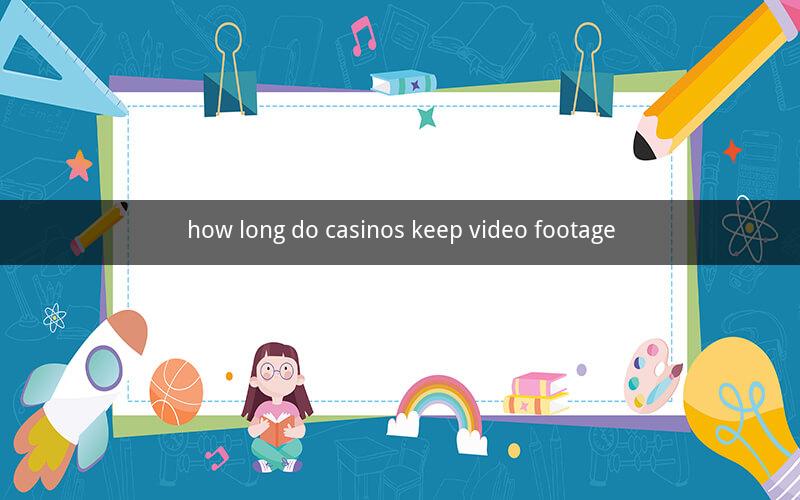
Table of Contents
1. Introduction to Casino Surveillance
2. The Purpose of Video Footage
3. Legal Requirements and Regulations
4. Retention Policies of Different Casinos
5. How Long Video Footage is Typically Retained
6. Factors Influencing Footage Retention Duration
7. Access and Retrieval of Video Footage
8. Ethical Considerations and Privacy Concerns
9. The Role of Video Footage in Security and Legal Proceedings
10. Conclusion
1. Introduction to Casino Surveillance
Casinos, as entertainment venues, have always been subject to stringent security measures. One of the key components of this security infrastructure is the use of video surveillance. These systems are designed to monitor activities within the casino, ensuring the safety of patrons and the integrity of the gaming process. Video footage serves as a crucial tool for security personnel, management, and law enforcement agencies.
2. The Purpose of Video Footage
The primary purpose of video footage in casinos is to deter and detect criminal activities. This includes theft, fraud, and other illegal behaviors that may occur within the premises. Additionally, video surveillance helps in resolving disputes, ensuring fair play, and maintaining the overall security and safety of the casino environment.
3. Legal Requirements and Regulations
The retention of video footage is governed by various legal requirements and regulations. These laws vary from country to country and even within different states or regions. In some jurisdictions, casinos are required to retain video footage for a specific period, while in others, there may be no legal obligation to do so.
4. Retention Policies of Different Casinos
Casinos have their own retention policies regarding video footage. These policies can vary widely, depending on the nature of the establishment, its location, and the specific regulations in place. Some casinos may retain footage for a few days, while others may keep it for several weeks or even months.
5. How Long Video Footage is Typically Retained
In general, casinos tend to retain video footage for a period that ranges from 30 to 90 days. This duration is often sufficient to cover any incidents that may require investigation or review. However, there are instances where footage may be kept for a longer period, particularly if it is required for ongoing legal proceedings or for ongoing security monitoring.
6. Factors Influencing Footage Retention Duration
Several factors can influence the duration for which video footage is retained. These include:
- The nature of the incident: More serious incidents may require longer retention periods.
- Legal requirements: Compliance with local laws and regulations is a crucial factor.
- Security concerns: Casinos may choose to retain footage for longer periods to ensure ongoing safety and security.
- Storage capabilities: The availability of storage space and the cost of maintaining it can also impact retention policies.
7. Access and Retrieval of Video Footage
Access to video footage is typically restricted to authorized personnel, such as security staff, management, and law enforcement agencies. Retrieval of footage can be done manually or through automated systems, depending on the casino's technology infrastructure.
8. Ethical Considerations and Privacy Concerns
While video surveillance is a necessary tool for security, it also raises ethical considerations and privacy concerns. Casinos must balance the need for security with the right to privacy of their patrons. This involves implementing strict policies and procedures to ensure that video footage is not misused or accessed by unauthorized individuals.
9. The Role of Video Footage in Security and Legal Proceedings
Video footage plays a critical role in security and legal proceedings. It can be used to identify suspects, provide evidence in criminal investigations, and resolve disputes. The accuracy and reliability of the footage are essential for its effectiveness in these contexts.
10. Conclusion
Video surveillance is an integral part of casino security. The retention of video footage is a critical aspect of this process, ensuring that incidents can be investigated and resolved effectively. While the duration of retention varies, it is generally in line with legal requirements and the needs of the casino's security and management teams.
---
Questions and Answers
1. Q: What is the primary purpose of video surveillance in casinos?
A: The primary purpose is to deter and detect criminal activities, maintain security, and ensure fair play.
2. Q: How long must casinos retain video footage?
A: The duration varies by jurisdiction and internal policies, typically ranging from 30 to 90 days.
3. Q: Can video footage be used in legal proceedings?
A: Yes, video footage can be used as evidence in legal proceedings, provided it is admissible and accurate.
4. Q: Are there any legal requirements regarding the access to video footage?
A: Yes, access is restricted to authorized personnel, such as security staff, management, and law enforcement agencies.
5. Q: Can video footage be accessed by the public?
A: No, video footage is not typically accessible to the public and is considered confidential.
6. Q: What happens if video footage is lost or destroyed before the retention period?
A: This could be a violation of legal requirements and may result in penalties or legal action against the casino.
7. Q: How is video footage stored in casinos?
A: Video footage is stored using various methods, including digital storage systems and cloud-based services.
8. Q: Can video footage be manipulated or altered?
A: Yes, it is possible for video footage to be manipulated, which is why its accuracy and integrity are crucial.
9. Q: What are the ethical concerns surrounding video surveillance in casinos?
A: Ethical concerns include privacy violations, potential misuse of footage, and the need to balance security with individual rights.
10. Q: How can patrons protect their privacy in casinos with video surveillance?
A: Patrons can be vigilant about their personal belongings and avoid engaging in suspicious activities to protect their privacy.